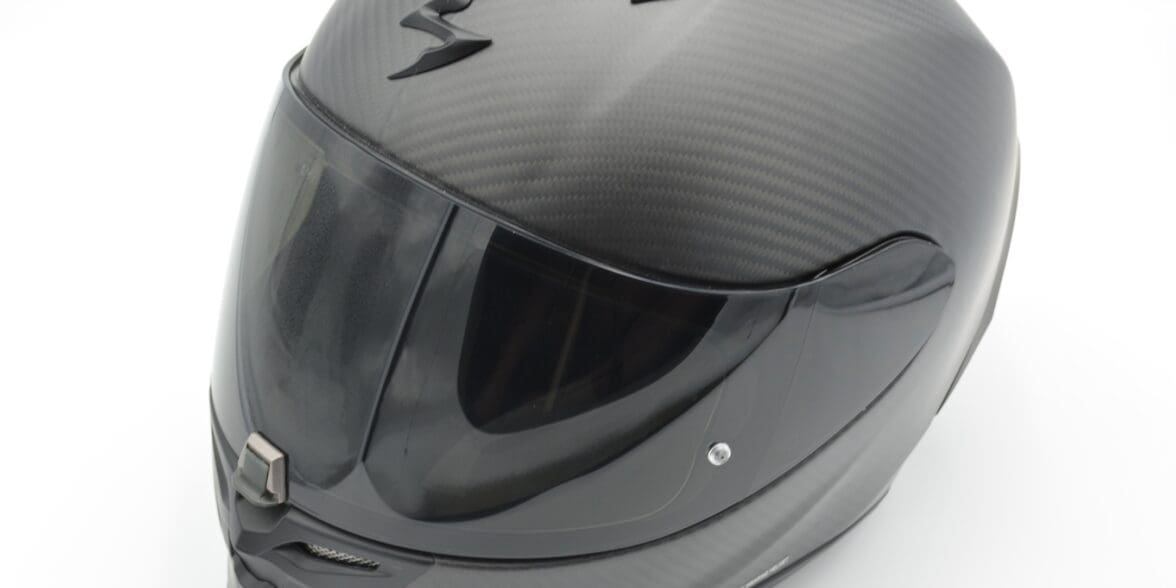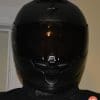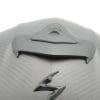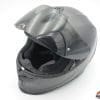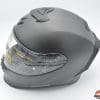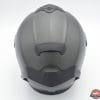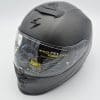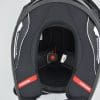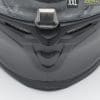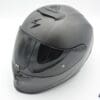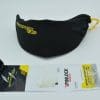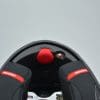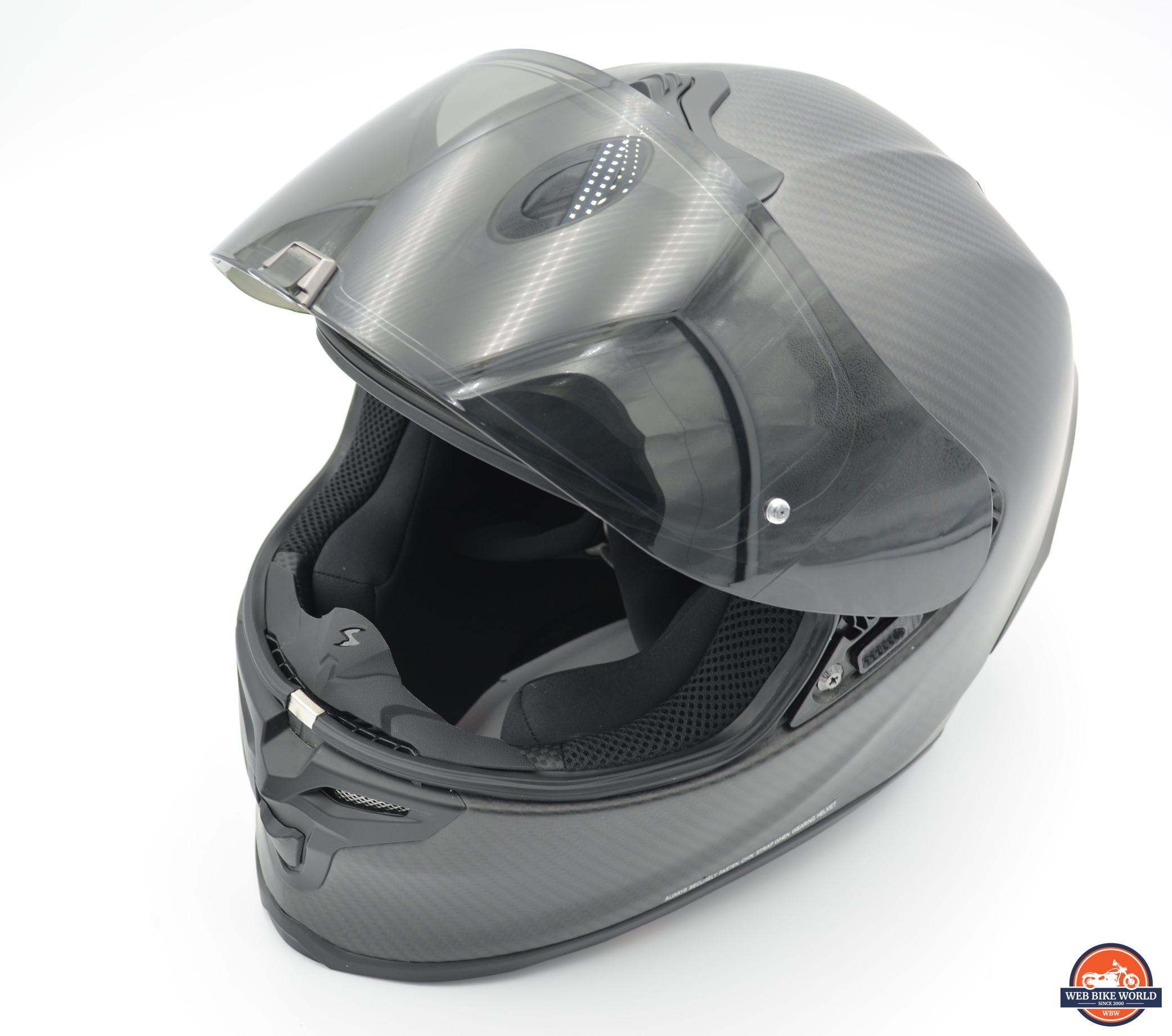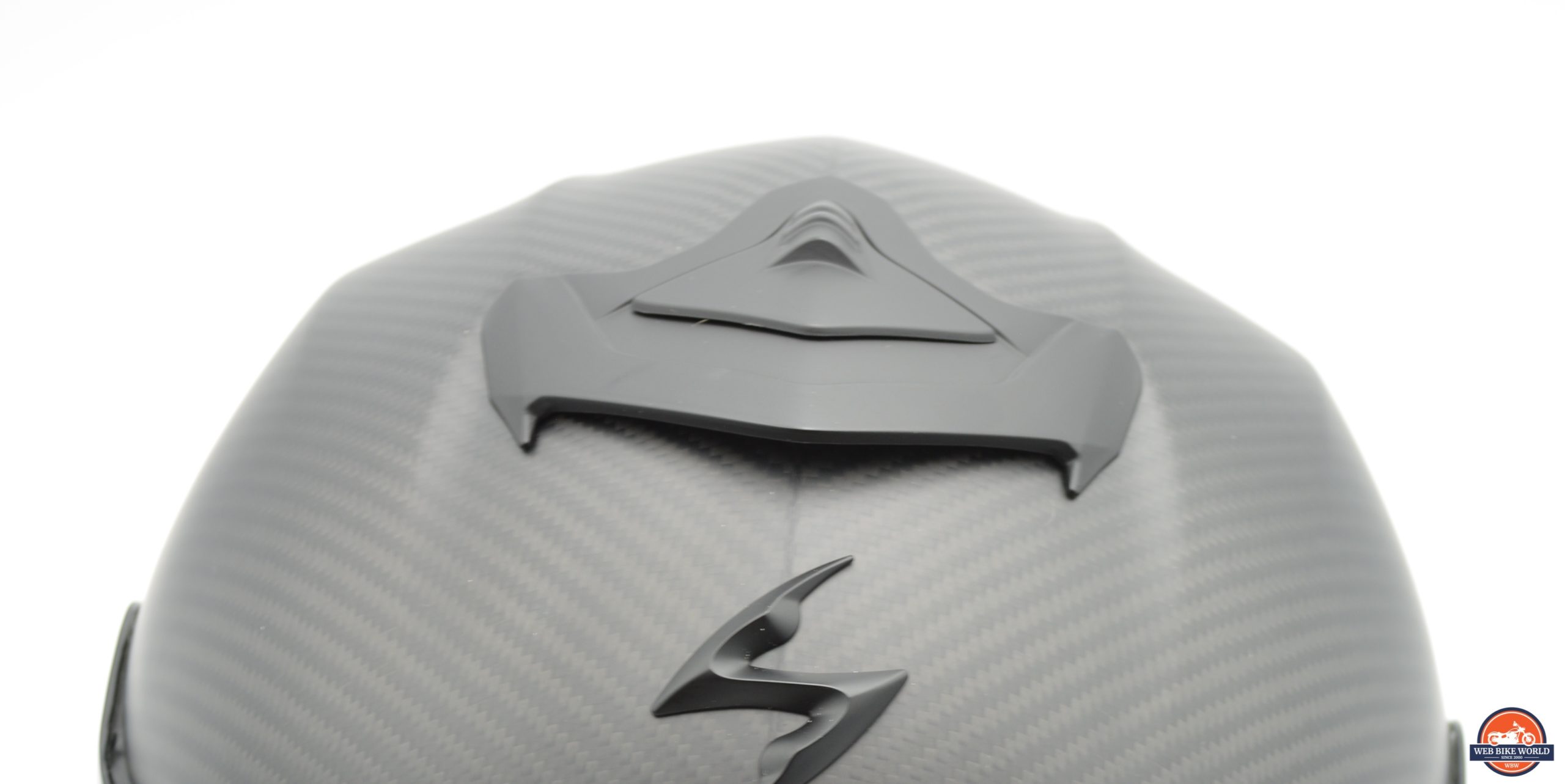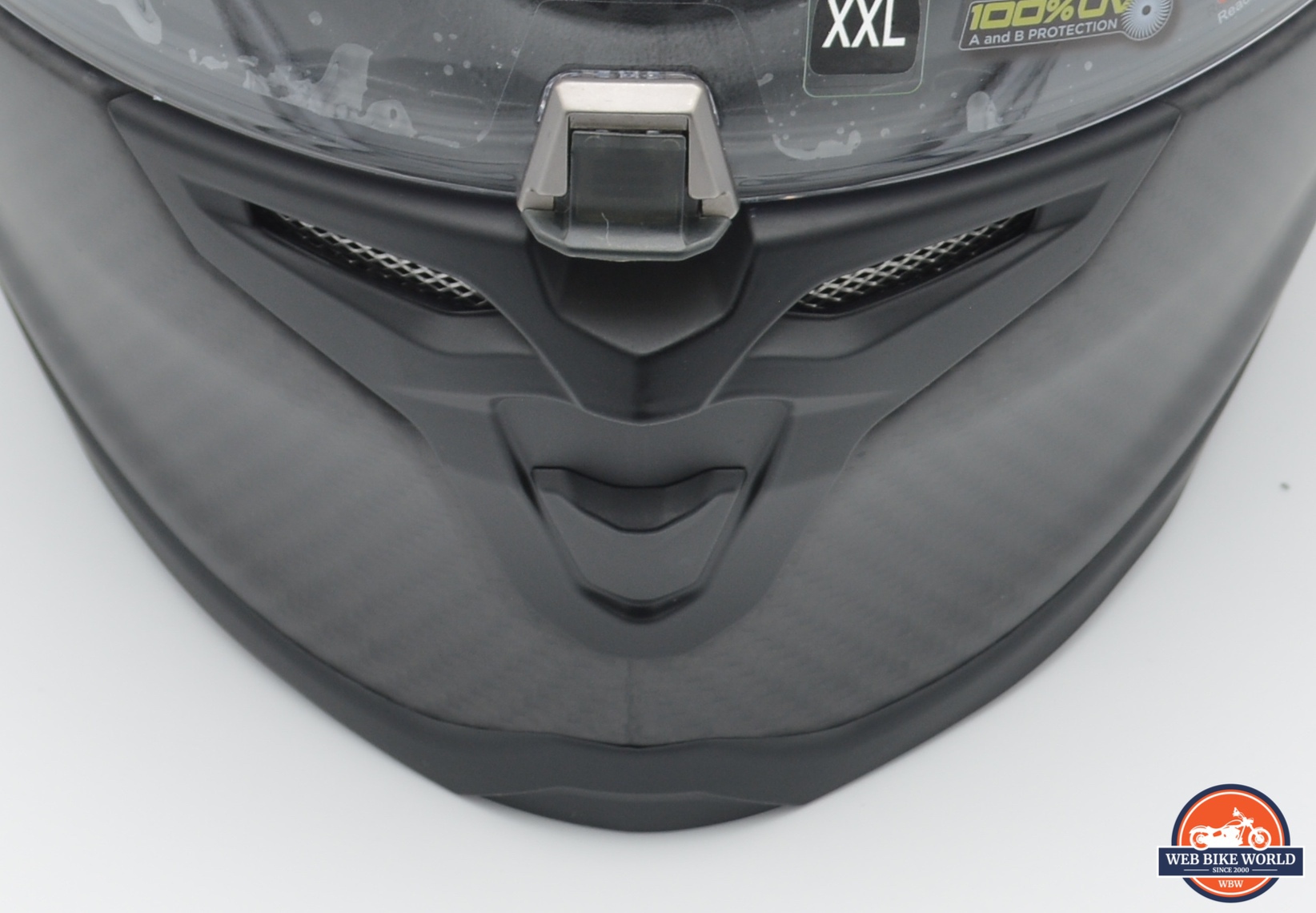As we riders know, helmets can range anywhere from $100 for a bargain basement product that offers just enough to protect you and not much else, all the way up to $2,000+ MotoGP and WorldSBK replica helmets that bring the technology of the track to your head. It is a difficult decision, and one of the most crucial, to determine what helmet best suits your budget and your riding style, while also maximizing the safety it provides.
Scorpion is quite famous for their strategy of providing high performance protection at affordable prices. This extends across all the products they offer, from motorcycle gloves and riding jackets, riding jeans with reinforced aramid liners, and of course, helmets.
The only area that I am aware of that Scorpion does not cut their budget is with their professional motorsports division, where the helmets are often custom made and fit to each professional rider they are sponsoring, such as Alvaro Bautista.
I’ve personally never owned or even worn a carbon fiber helmet, so when the opportunity arose through a series of very fortunate events for me to test the latest and greatest version of the R1 Air Carbon, I of course said yes.
The only downside to my accepting the testing was that for Calgary, our riding season was running out—it usually only lasts until mid-October at the latest, so I had to pick and plan my riding days around the weather quite carefully. But, for the sake of this review, I donned all my cool weather gear, hopped on my Ninja 650, and got out there so I could make this review happen!
About Scorpion
Scorpion Sports USA is a subsidiary of Kido Sports, a South Korea-based motorcycle helmet and gear developer that has been in the helmet business since 2001. The Scorpion website likes to mention a number of global facilities, including a couple in the USA, but all of their helmets are manufactured in China.
These helmets are designed by an international team of helmet engineers from Korea, Europe, and North America, and built to strict tolerances. Given that Scorpion is the official helmet supplier to many global racing stars, you shouldn’t worry about how or where they’re manufactured. Let the quality of the helmets speak for itself!
About webBikeWorld’s Review Policy
This product was supplied by Scorpion USA at a significant discount for me to buy for review purposes. Note that we do not allow brands to influence review scores or content. Please see our review policies for more information.
We here at webBikeWorld believe that you can’t just try something out once and give an honest opinion of it. Any product we test is actually used by our testers, and for most of September and October, whenever I was out on the bike, I wore this helmet.
Scorpion EXO-R1 Air Carbon Features
The most striking feature of the EXO-R1 Air Carbon at first glance is the absolutely beautiful carbon fiber weave on display. In terms of aesthetics, it gives the same initial impression that you feel when you look at a supercar with naked carbon fiber showing—that feeling of it being that little bit extra special and unique.
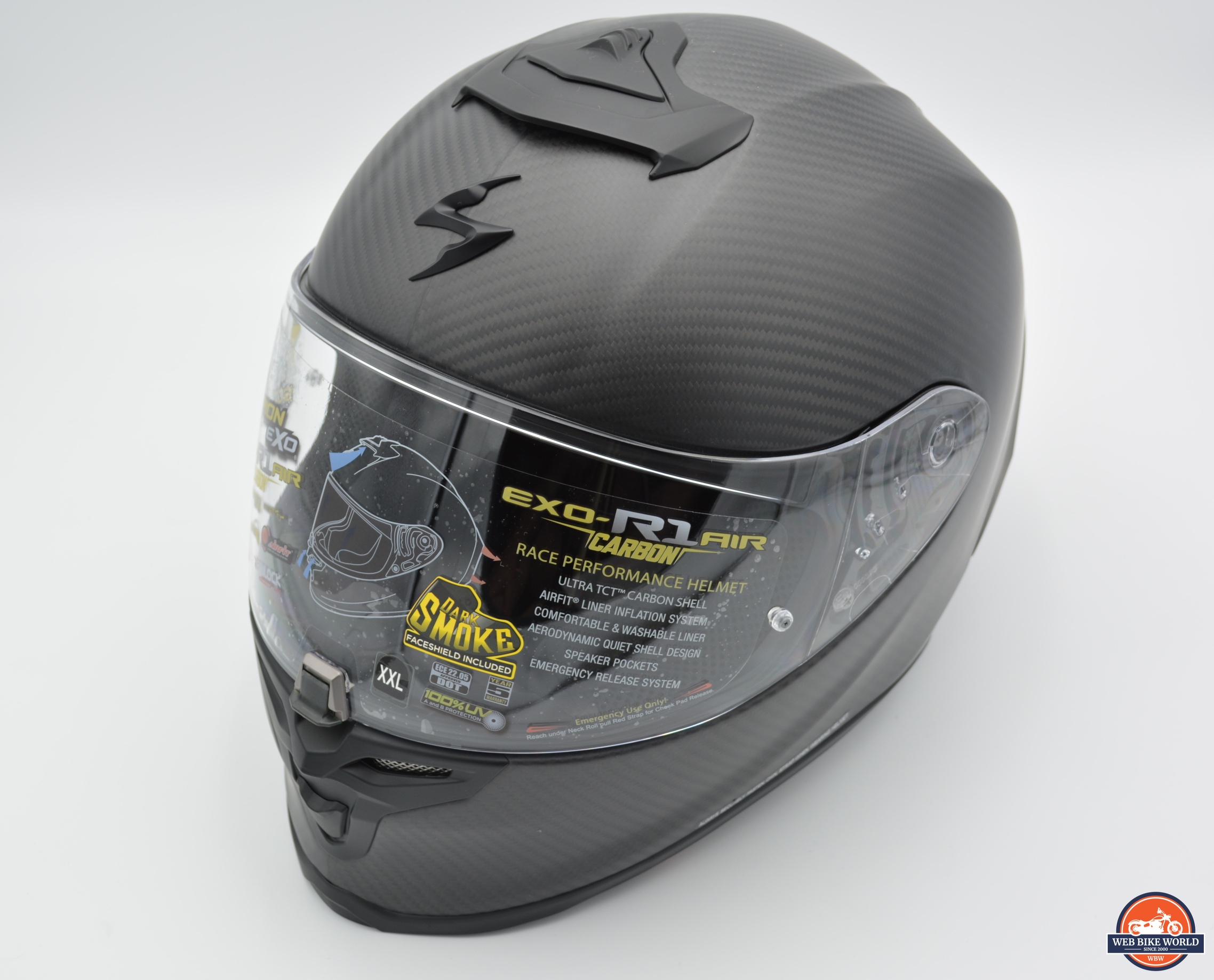
The second feature I noticed, while carefully handling the helmet to admire the carbon fiber, is just how damned light the helmet is. Out of the box, with the liner, smoke visor, and pinlock inserted, the helmet tipped my digital kitchen scale at a scant 1360 grams.
Scorpion themselves state that without the liner and visor, the shell weighs only around 1200 grams. I can believe that without a doubt.
Another pleasant feature of the R1 Air Carbon is that, much like my HJC i10 helmet that has fast become my go-to for riding, there is a visor lock at the front of the visor, out of the eyelines, which will hold the visor closed at speed. However, this lock is much more solid, slotting home with a very loud click, and requiring a good bit of pressure to release.
I think this lock is part of the motorsports side of things coming down to the street level, as this is the kind of lock I would want for sure if I was tapping my knee against an apex on the track.
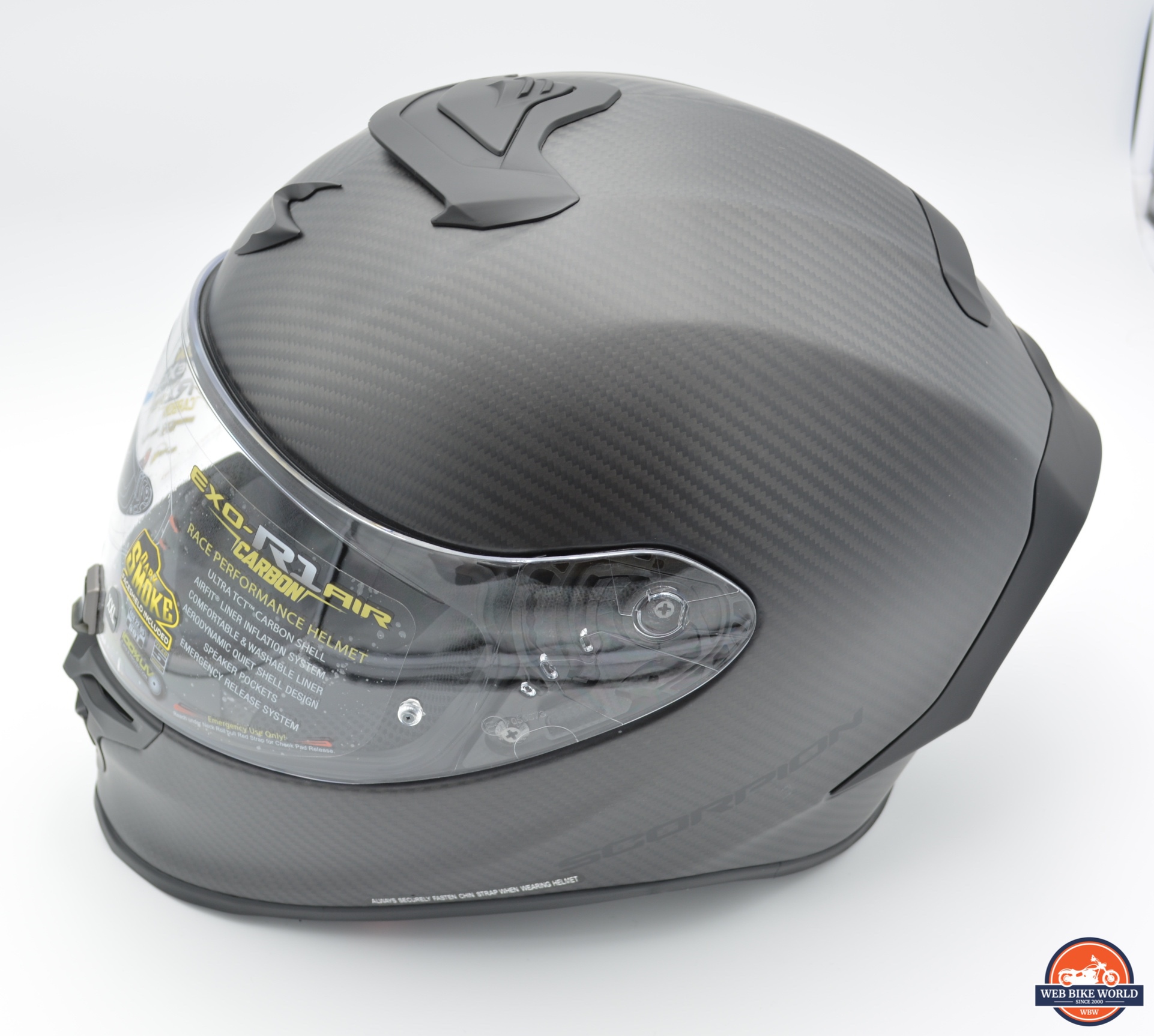
The R1 Air Carbon comes with two visors (one clear, one smoked) a pinlock insert, a premium fabric helmet bag, and a visor bag for the visor you are not using. For $550, that is a lot of kit that would have otherwise cost extra, and it shows that even in their top-end stuff, Scorpion is thinking about value for their customers.
Scorpion EXO-R1 Air Carbon Fit & Comfort
My head is an intermediate-to-intermediate-long oval shape, and I seem to fall right in the middle of that division. I can’t slip an intermediate oval Arai helmet over my head, but a long oval Shoei helmet feels loose and wobbles around.
This issue, as you can imagine, is a challenge when trying to find helmets that fit snugly but without causing pressure points (I also have a prominent cranial ridge that starts dead smack in the middle of my forehead).
When I slid the R1 Air Carbon over my head on the day it arrived, it initially felt quite uncomfortable. I lined up the nose guard over my (rather large) nose, and it felt like the helmet was levering against the basilar skull and my forehead, trying to open my head like a bottle opener.
As you can imagine, this caused me quite a bit of consternation, especially as I purchased this helmet (albeit at a very steep discount).
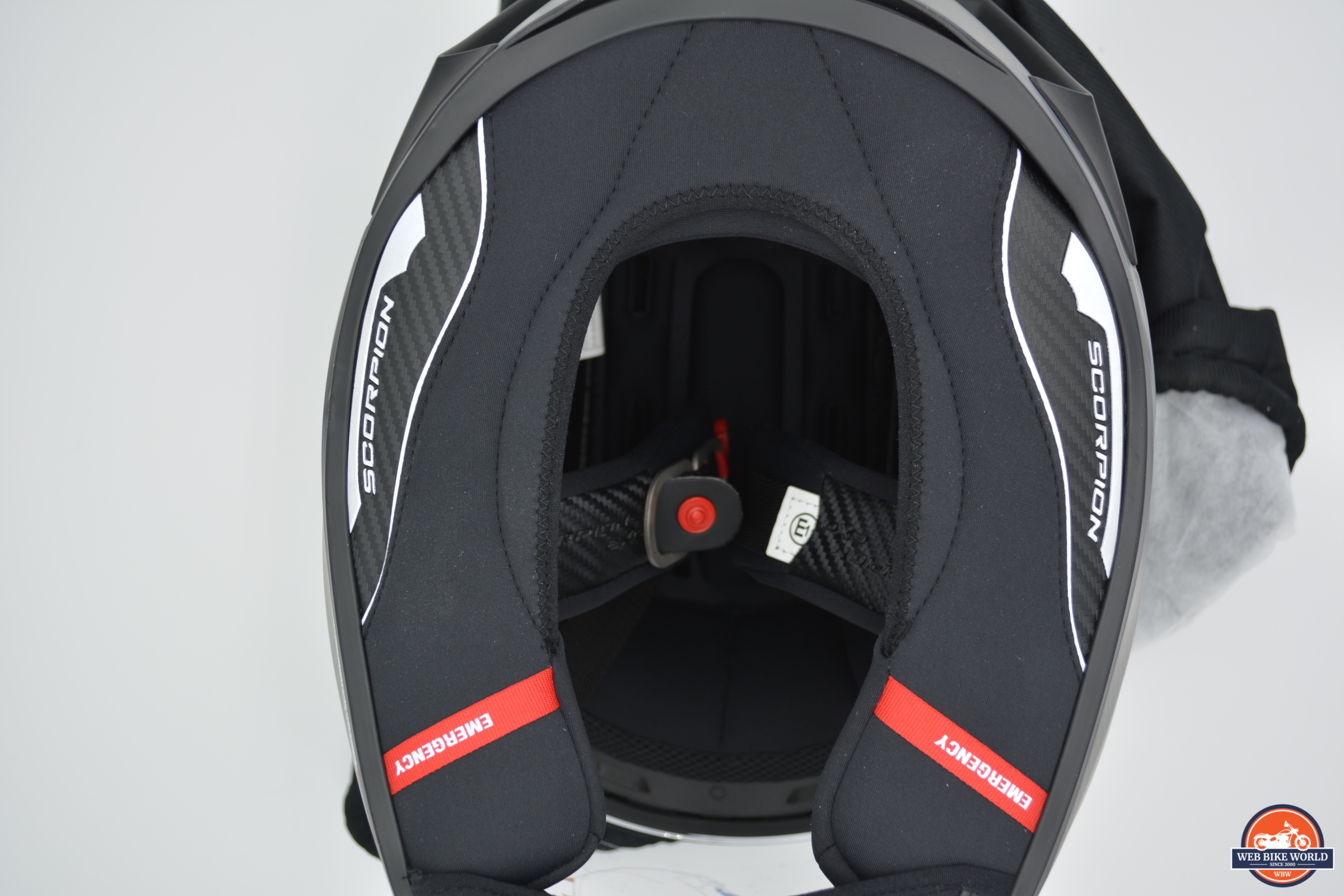
I even went so far as to contact Scorpion about the fitment issue, and I lucked out. The person who replied to my email was an avid track rider, and suggested something that had escaped my thought process. Following his directions, I took out the nose guard, slipped the helmet on again, and then grabbed the chin bar and pulled the front of the helmet down.
POP!
The helmet sat home immediately, and any sign of any pressure was immediately gone. It had not occurred to me that since the R1 Air Carbon is, for all intents and purposes, the Scorpion R1-GP MotoGP helmet, that the chin bar was meant to sit very low to cut into air that would otherwise flow around the neck. My eyes were in the middle of the visor port, but the chin bar started at my upper lip—not just under my nose.
The moral here is that helmets have different shapes, and the way that my HJC i10 fits well is not the way that the R1 Air Carbon fits well. It did feel a bit strange having a chin bar that went below my actual chin by a good ¾ inch—but once I took it out riding, it all made sense, and I will cover that more in the Real World section.
The last thing to talk about in the fit and comfort section here is why the R1 Air Carbon has the word “Air” in the title. This is because the helmet has Scorpions AirFit (sometimes known as KwikFit) system in it, which is controlled through a big red pump pad in the chin visor, and a small metal release valve beside it.
There are air bladders along the jawline and cheek pads of the helmet, all the way back to just under the ears. Pumping up the bladders squeezes the cheek pads against your jaw and cheeks. This allows for a nearly custom fit, and I also didn’t feel like it was squeezing all that hard until I tried to take the helmet off.
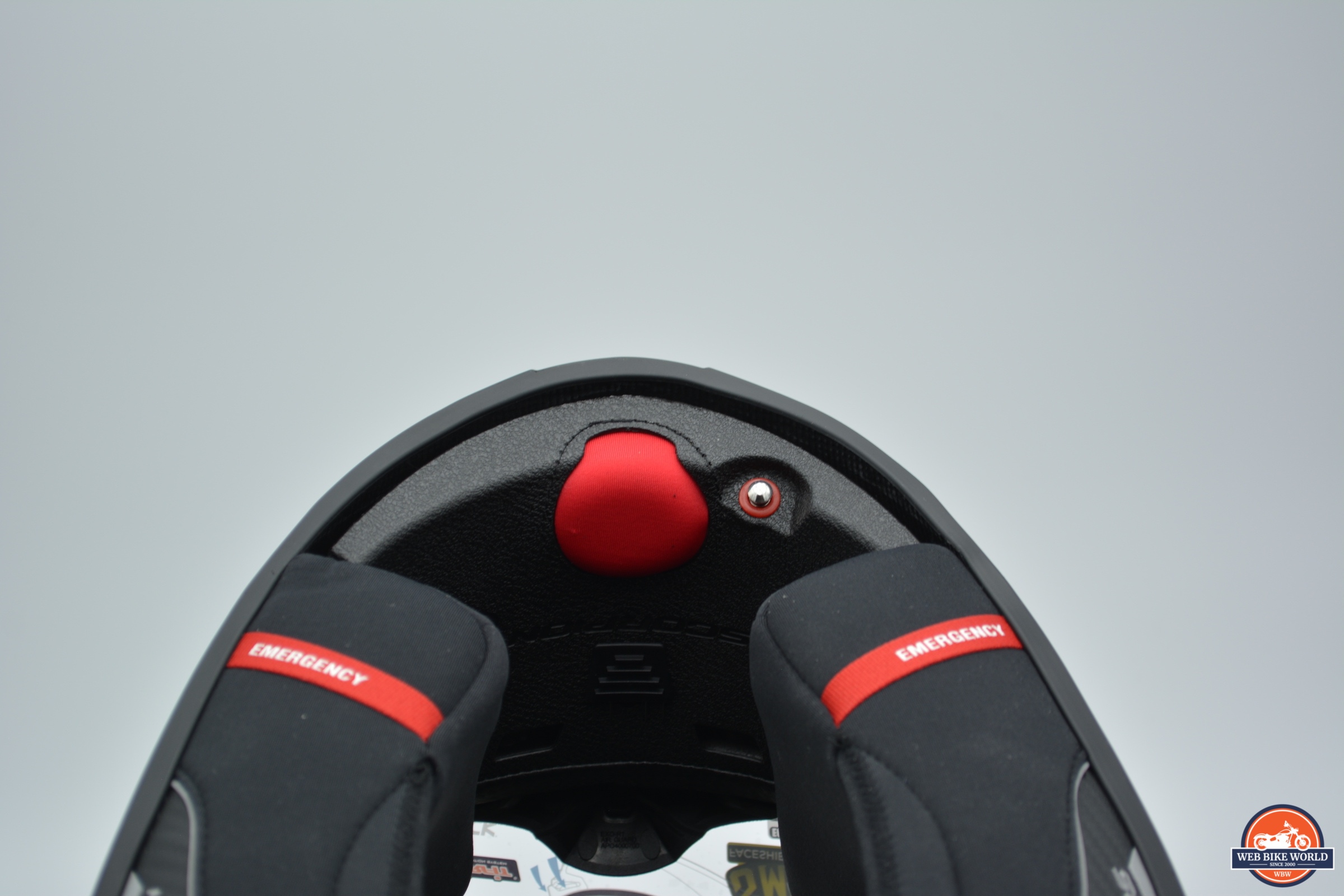
There is a small issue with the AirFit system that I found, but I suspect that it is just me being nitpicky. Although the big red pump is very easy to hit with a glove, when the chin skirt is installed, finding the smaller metal release valve push button is quite difficult with gloves on.
Why I think this is nitpicking is that I wouldn’t imagine many people pumping the system up and then releasing it while riding. I suspect most would only want to release it after arriving at their destination and taking off their gloves.
Scorpion EXO-R1 Air Carbon Visor & Vision
Apart from the Scorpion EXO-HX1 I reviewed earlier this year, I must agree with my fellow reviewers who have previously tested the 2020 R1 Air and the 2021 R1 Air Bautista Edition. The visor ports on these helmets are, in a word, massive.
While looking straight ahead, I could not see the chin bar in my peripheral vision. I saw only a sliver of the top of the port, and I couldn’t see the sides of the visor port. Also, the visors themselves are 99% optically correct—so there is no distortion at all to the road or vehicles around you.
The inclusion of a Pinlock Max in the box is a very pleasant addition, and since I do almost all of my riding in the daytime, I installed the pinlock on the dark smoke visor and then installed that visor onto the helmet. This was made exceptionally easy with the toolless visor hinge locks, for which you only need to pull down on two little tabs to make the whole visor pop off.
Line up the new visor with the guide slots, and a gentle push locks it into place on each side. It took me all of 30 seconds to change out the visors.
The polycarbonate of the visors themselves is also very impressive. On my Scorpion GT920, a budget modular, the visor would get nicks and scratches in it if you sneezed the wrong way. On the R1 Air Carbon, I’ve taken a pebble straight into the middle of the visor, with no discernable mark to the polycarbonate.
Scorpion EXO-R1 Air Carbon Ventilation
The R1 Air Carbon uses two main intakes and a combination exhaust to move air through the helmet. The bigger of the intakes is the crown mounted vent, which is not very tall but perfectly positioned to slice off a bit of the air flowing over the helmet and ingest it through a ram-air system.
This crown vent is controlled by a two position slider, which is very tactile and has positive, chunky movement.
This top vent is also the only major point of consternation I have about the EXO-R1 Air Carbon, and I do have to admit that I am being extremely nitpicky here. I would have preferred to have two separate, independently-controlled intake vents so that I could cool one side or the other of my head more depending on riding conditions.
That said, the ram air vent does take in a hell of a lot of air. It also sends it through multiple channels in the EPS to cool your brow, forehead, and crown quite effectively.
The other major intake is in the chin bar, and has a solid open or closed slider that won’t accidentally move with air pressure or even a slight bump. This intake separates into a visor vent and a face vent, and a small slider on the inside of the chin bar lets you direct more air either up to the visor or down to your mouth and face.
To pull all this air out, a small spoiler at the rear of the helmet pulls the hot air out via the venturi effect. Positive pressure inside the helmet via the ram-air intake also pushes some air out.
You won’t get much airflow through the helmet at lower speeds (under 25mph or so). Once the air gets moving, however, you will be able to distinctly feel the flow around the front of your head and across your face. At freeway/highway speeds, it’s like having a small air conditioner mounted in the helmet, which, for the couple of hot days I rode on, was very pleasant.
Scorpion EXO-R1 Air Carbon Build Quality
This is the shortest section of this entire review because I can find absolutely no fault with the construction of the R1 Air Carbon. Unlike the other helmets in the R1 lineup, this helmet forgoes the aramid and poly-weave fibers and instead uses resin-infused TCT-U 3K Carbon Fiber.
This style of resin and carbon fiber, when woven together and cured, imparts the same strength and flexibility as the carbon fiber used in aircraft wings. All of which is to say that this helmet is incredibly sturdy.
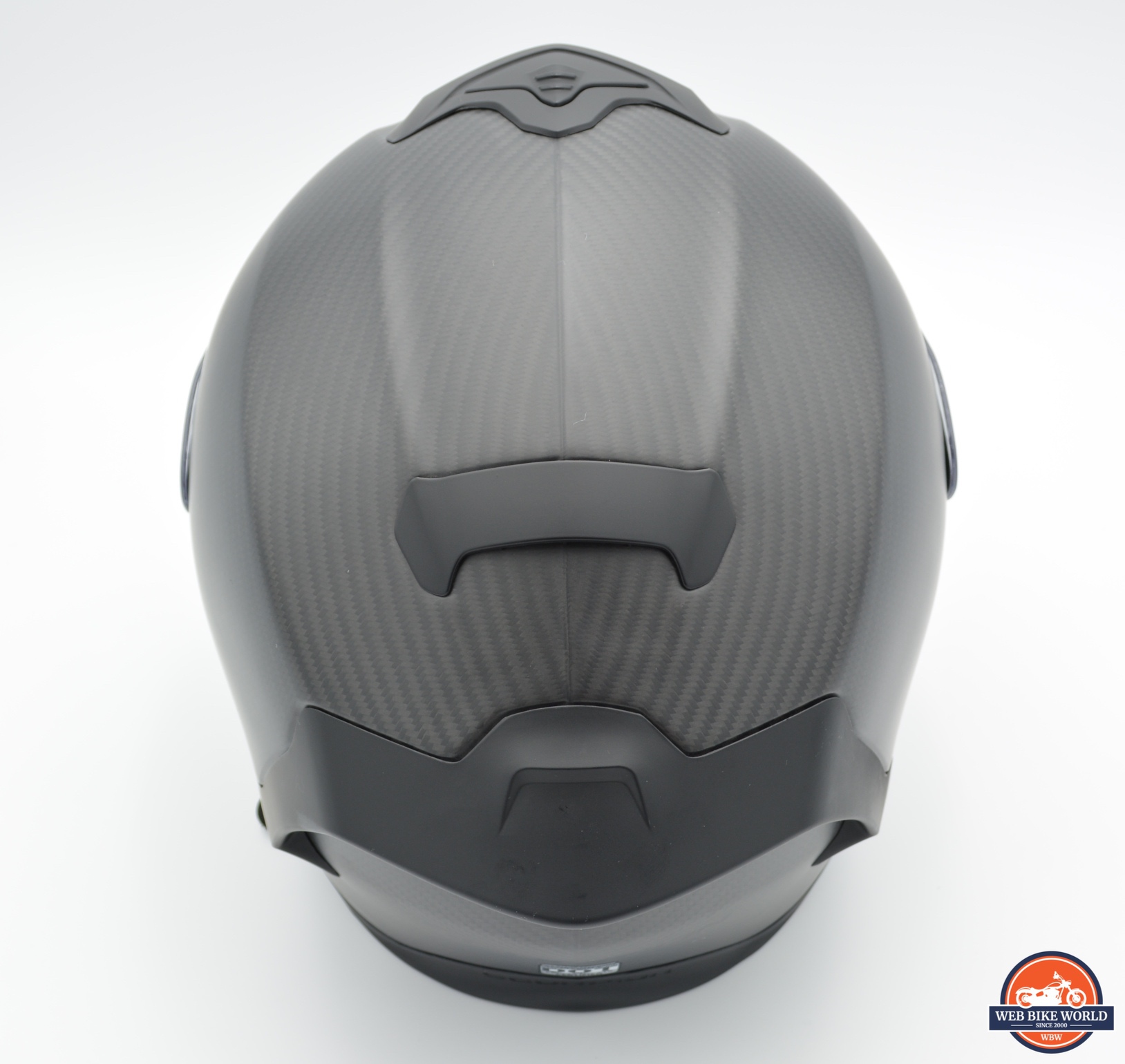
The matte coating over top of the carbon fiber is also extremely tough. It has taken gravel strikes from truck tires, several bugs sacrificing themselves upon it, and even being accidentally scraped an inch across pavement without any discernible marks.
The liners fit perfectly, the chin straps are solidly mounted, and the double-D ring fastener is double sewn to the straps. I don’t think I could rip them off with a hydraulic ram, they feel so solid.
In other words, the Scorpion EXO-R1 Air Carbon is simply the finest helmet I have had the pleasure of reviewing when it comes to its build quality. The fact that the carbon weave lines up across the central split line shows just how much attention to detail was put into making this helmet, and unless and until I get to test something that surpasses it, this helmet will be my gold standard for build quality. I cannot find any fault at all.
Scorpion EXO-R1 Air Carbon In the Real World
The first thing you have to realize about the R1 Air Carbon is that it is the street version of a racing helmet. The R1-GP helmet for MotoGP and WorldSBK is the design blueprint for this helmet, and it follows those lines very closely. In fact, the only issues I think I found during testing were the AirFit system (as the liner wasn’t made from a laser scan of my head), and the visor not coming with tear-offs out of the box (although it does have tear-off mount pegs!).
As I mentioned a few paragraphs ago, the biggest difference between this helmet and all of the others I’ve tested is just how far down the chin bar drops below my actual chin, clearing it by a good ¾ inch. This puts the tip of the chin bar, if I am astride my bike and leaning slightly forward, over my trachea and collar area. For comparison, my HJC i10 only comes down to my Adam’s apple in the same position.
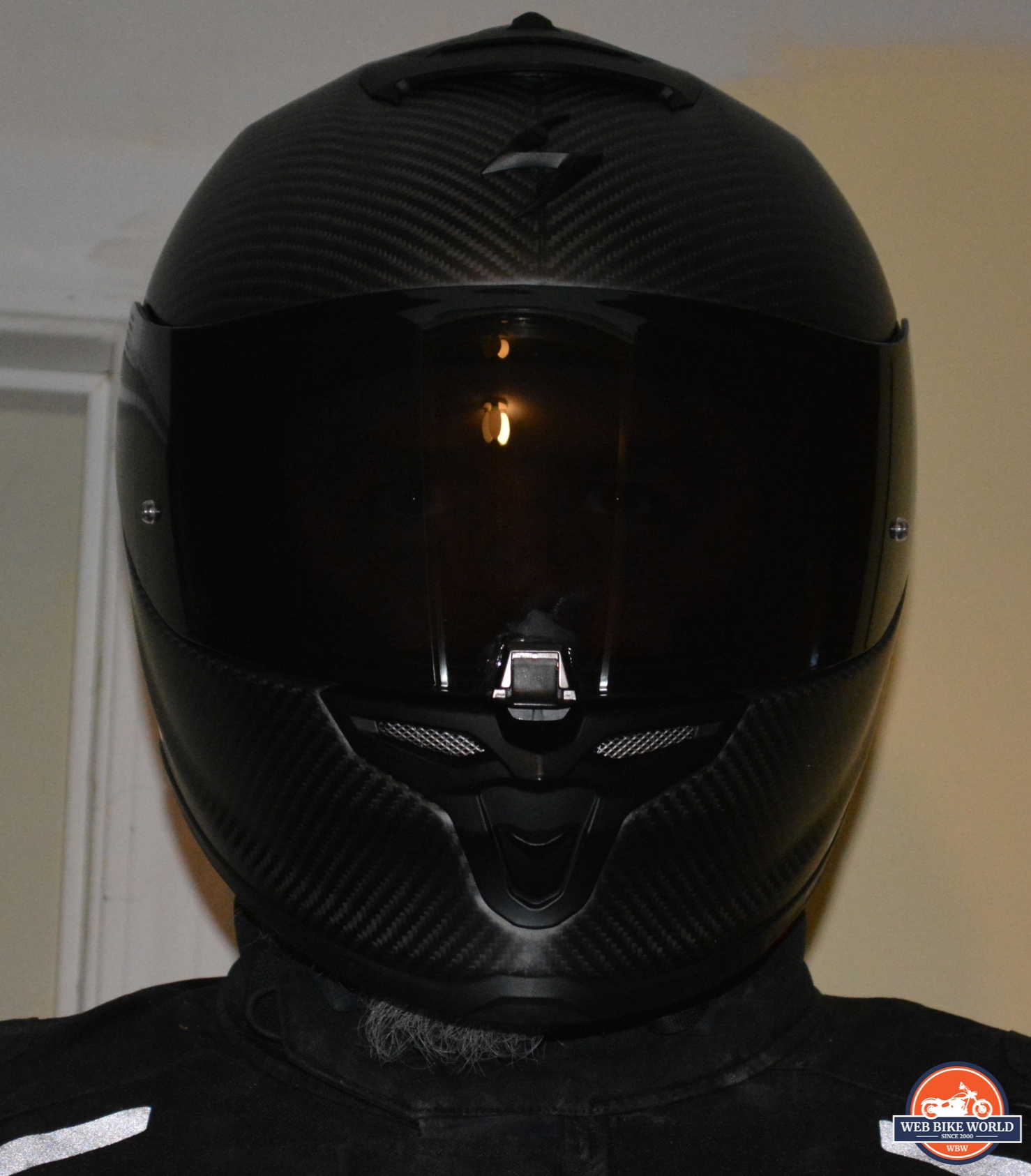
I didn’t think there would be much difference between a SNELL M2020 rated polycarbonate track helmet (the HJC) and a helmet that is literally a copy of a true racing helmet (the Scorpion), but that extra chin coverage amazed me. One of the few complaints I had about the i10 was the subtle wind noise I would get from under the sides of the helmet. I didn’t get any wind noise from under the sides of the R1.
I was wondering if I was wearing it wrong the first time I pulled it on, so I brought my clutch hand up to the left side of my helmet as I was riding—and sure enough, I could feel the air being deflected by the tip of the chin bar.
The R1 Air Carbon is a very aerodynamic helmet. Compared to all the other helmets I’ve tested in 2021, the noise from air moving across its surface was minimal.
I wear washable and reusable silicone earplugs when riding that have small air channels to let comms systems and GPS directions/music/etc through and tune out the air roar, and I can honestly say I could ride without them in the R1 Air Carbon. NOTE: I am not saying you should ride without ear protection! Always wear earplugs when riding a motorcycle!
What surprised me in terms of noise, however, was how quiet the crown intake was. I would have thought that splitting the air flow and compressing that air before forcing it through two tiny holes to the head would have caused some kind of whistle, roar, or whine, but it was absolutely, completely, and utterly silent.
It seems that Scorpion paid attention in geometry class, because the angle of intercept with the airflow over the helmet is perfect. It cuts some of the air for cooling, but does so at just the right angle to make it silent.
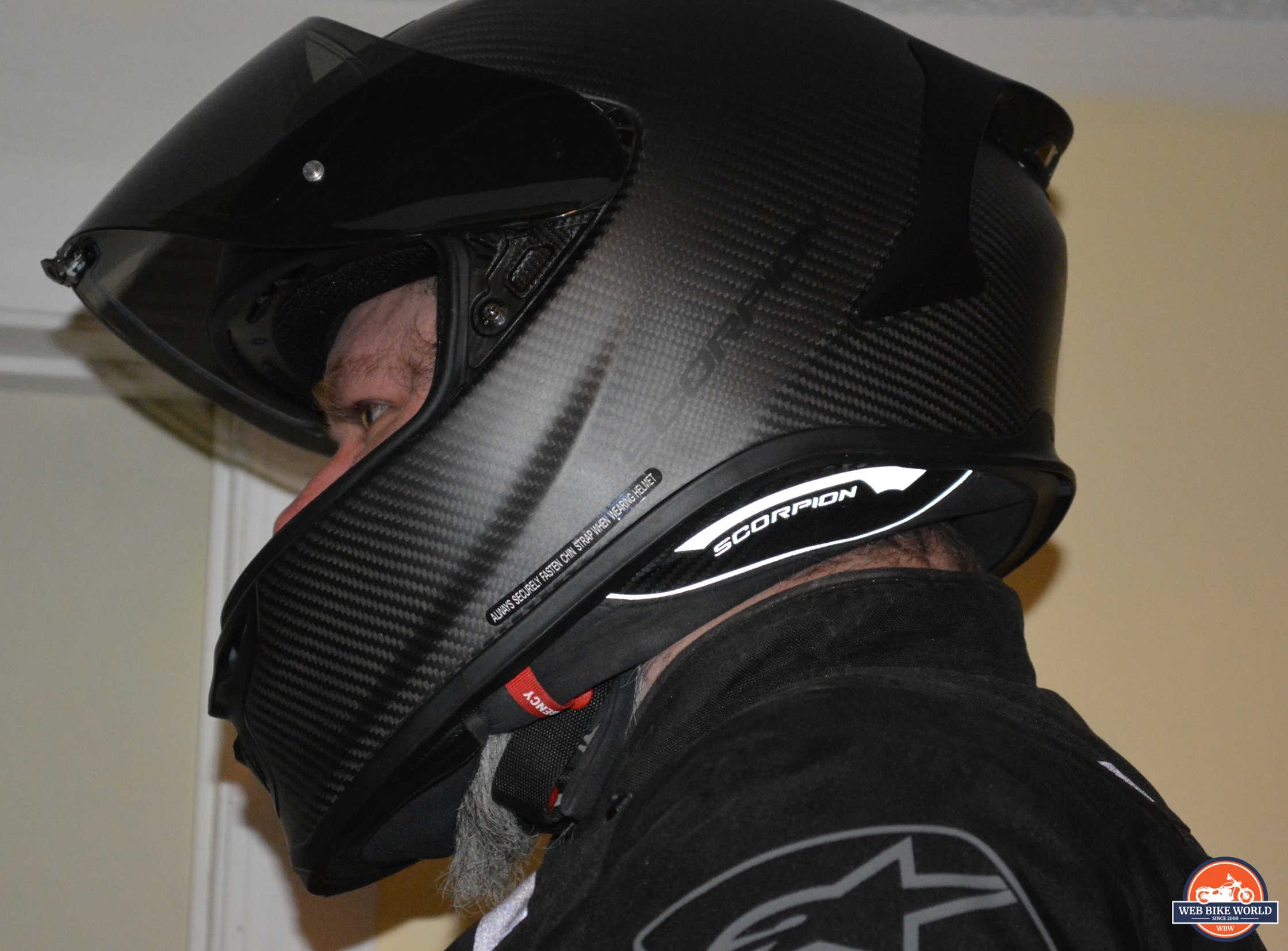
As I was riding during warm days above 15 C (60 F) and cold days, sometimes down to 3 or 4 C (37 to 40 F), I found that the helmet reacted slightly to temperature. While the shell remained sturdy on the colder days when riding at the speed limit, I did hear the visor creak ever so slightly with the wind against it and my body heat behind it—the temperature difference caused some slight contraction and expansion.
The other thing I found during cold day riding was that if I locked the visor down with the strong locking clip, I had to pop the bike into neutral at a stop light, hold the bike on the rear brake, and use two thumbs to pop the clip open sometimes. As the clip is metal, I suspect the same contraction is happening—but without my body heat expanding it, it gets a little tight.
Then again, when you’re roaring down the front straight of a track at 200 KPH or more, you don’t want a weak clip holding the visor down, so I am not holding any marks back because of that.
Final Thoughts: A Proper Race Helmet, Adapted For The Street
To say that I am wildly impressed with this helmet is an understatement. I’ll sum up what I’m about to write for this section in one sentence, and you can read the rest as a bonus if you’d like. To wit: The Scorpion EXO-R1 Air Carbon is the best helmet in every way that I have tested to date, and will be what I compare other helmets against as I move forward in reviews.
These may be the highest marks I’ve given any review product, but the helmet is just that good.
Yes, it looks like the helmet is twisted on my head, but I have a bent nose, and as you can see, the cheek pads are still holding tight even after over a month of riding. Vision through that visor port is superb.
I can find no fault in the build quality. The carbon fiber weave is exquisite, the weight feels like you aren’t wearing a helmet at all after a few minutes of riding, and the visor port is huge, keeping your vision clean and clear.
The ventilation, which I thought would be a repeat of a previous helmet I’ve reviewed, the Scorpion HX1, was superb, keeping me sweat-free almost the entire time. The AirFit system and KwikWick liner are excellent, and hold the helmet solidly in place.
The aerodynamics are fine tuned to the point that there is little to no excess wind noise, and that little extra dip down in the height of the chin bar makes a world of difference when riding at speed, splitting the air so that it doesn’t curl up under the sides of the helmet and cause wind noise.
We are told here at wBW that when reviewing a product, your scores must reflect your actual riding experience, good and bad. I’ve been as honest as I can about my experience with the R1 Air Carbon, and could only find faults if I was very, very picky—namely the single crown intake control, and the size of the pressure relief valve button for the AirFit system being hard to find with gloves on and the chin curtain installed. Other than that, this is simply the best helmet that has graced my head.
Pros
- Fully carbon fiber shell is lightweight but extremely strong
- AirFit system allows for an almost custom fit
- Visor has strong detents, and can be solidly locked down with excellent front clip
- Maximum airflow through minimum intakes, keeping noise down
- No feeling of buffeting at all, even at highway/freeway speeds
- Multiple visors included, with a 30 second changeout time through well engineered hinge points
- Finish on the matte carbon is excellent, and resists bugs, scratches, and even gravel impacts without marking up
Cons
- The helmet is distinctly intermediate oval, so round oval and long oval riders are out of luck
- The visor lock can be difficult to operate on colder days
- Crown intake is a combined ram-air intake, no individual control of left/right intakes
- With chin curtain installed, the AirFit deflate button can be hard to find with gloves on
wBW Specs
- Manufacturer: Scorpion
- Price (When Tested): $549.95
- Made In: China
- Alternative models & colors: Gloss Carbon
- Sizes Available: SM, MD, LG, 2XL, 3XL (Tested 3XL)
- Review Date: September & October 2021
Important Links / Where to Buy


